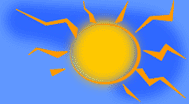|
Spanish Wizz 3.0 Spanish Whiz 3.0 (link) Buensoft Spanish 1.5 Buensoft Spanish 1.5(link) I have two language programs that you can download(I have tested, but not used either of these programs, I hope that they hepl!!!), and soon I will have list of common phrases that you may want to know. I think that if you have phone line internet, you may want to go to the links to download your program. More Basics
Greetings
Here are some basic Spanish greetings. Like English speakers, we can use a variety of phrases to convey basically the same meaning.
Hola! Hello
Buenos das Good morning
Buenas tardes Good afternoon
Buenas noches Good evening
You should notice the difference between Good morning, afternoon, and evening. We use buenos dias, and buenas tardes/noches. We'll cover the reasons why later, but for those who are curious it is because of the difference in gender between dias and tardes/noches
How Are You?
When people who are familiar with each other use a greeting, they'll also often ask how are things. There are two common phrases used to ask how someone is
Hola! Que tal? Hi. How are things?
Cmo est / ests? How are you?
In the Spanish language, we differentiate between informal and formal language. To show respect, to one's collegues or to someone you don't know, one uses formal language (Cmo est?). For friends and family, you can use informal language (Cmo ests?).
Replying to greetings is easy. You can return the greeting, and ask how someone is doing. If someone has already asked you a question, you can reply and then ask the same of them.
Hola! Cmo ests? Hi. How are you?
Estoy bien. Y t? I am well. And you?
In this example, we have been asked how we are. After answering the question, we ask the same. This example uses informal speech, so let's see what formal speech would be like.
Hola! Cmo est? Hi. How are you?
Estoy bien. Y usted? I am well. And you?
In this case, the dialogue isn't very different. You should notice, however, that we used the word usted rather than t. Both word mean you, but usted is the more formal form. This fits with the formal form of the question (est not ests).
What Is Your Name?
Asking someone their name is extremely easy in Spanish. Remember however that there is a formal and an informal way of asking things - so if you don't know someone's name its unlikely that you'll be informal.
The simplest way is to ask either of the following
Como se llama? What is your name?
Cual es su nombre? What is your name?
Why are there two ways of asking this? In most languages, there are different ways of asking the same question - use which ever you're most comfortable with, but make sure you can understand both questions. Literally, the first is asking "how are you called", but we understand this to mean what is your name.
To reply, we could answer in either of the following ways
Me llamo Jos (literally) I am called Jos
Mi nombre es Jos My name es Jos
Goodbye
There are many ways to say goodbye in Spanish, just as there are many ways to greet someone. The following is a list of simple phrases, that mean goodbye or see you.
Adios! Bye!
Hasta luego See you later
Hasta maana See you in the morning
Vaya con dios Farewell - (Literally) Go with God
|

